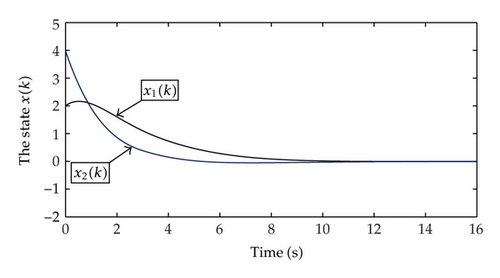Robust Exponential Stability for LPD Discrete-Time System with Interval Time-Varying Delay
Abstract
This paper investigates the problem of robust exponential stability for uncertain linear-parameter dependent (LPD) discrete-time system with delay. The delay is of an interval type, which means that both lower and upper bounds for the time-varying delay are available. The uncertainty under consideration is norm-bounded uncertainty. Based on combination of the linear matrix inequality (LMI) technique and the use of suitable Lyapunov-Krasovskii functional, new sufficient conditions for the robust exponential stability are obtained in terms of LMI. Numerical examples are given to demonstrate the effectiveness and less conservativeness of the proposed methods.
1. Introduction
Over the past decades, the problem of stability analysis of delay discrete-time systems has been widely investigated by many researchers. Because the existence of time delay is frequent, a source of oscillation instability performances degradation of systems. Stability criteria for discrete-time systems with time delay is generally divided into two classes: delay-independent ones and delay-dependent ones. Delay-independent stability criteria tend to be more conservative, especially for small-size delay; such criteria do not give any information on the size of the delay. On the other hand, delay-dependent stability criteria is concerned with the size of the delay and usually provide a maximal delay size. Moreover, robust stability of linear continuous-time and discrete-time systems subject to time-invariant parametric uncertainty has received considerable attention. An important class of linear time-invariant parametric uncertain system is linear parameter-dependent (LPD) system in which the uncertain state matrices are in the polytope consisting of all convex combination of known matrices. To address this problem, several results have been obtained in terms of sufficient (or necessary and sufficient) conditions; see [1–15] and references cited therein. Most of these conditions have been obtained via the Lyapunov theory approaches in which parameter dependent Lyapunov functions have been employed. These conditions are always expressed in terms of linear matrix inequalities (LMIs) which can be solved numerically by using available tools such as LMI toolbox in MATLAB. The results have been obtained for robust stability for LPD systems in which time delay occur in state variable such as [6, 11, 14] present sufficient conditions for robust stability of LPD continuous-time system with delays. However, a few results have been obtained for robust stability for LPD discrete-time systems with delay.
In this paper, we deal with the problem of robust exponential stability for uncertain LPD discrete-time system with interval time-varying delay. Combined with the linear matrix inequality technique and the use of suitable Lyapunov-Krasovskii functional, new sufficient conditions for the robust exponential stability are obtained in terms of LMI. Finally, numerical examples have demonstrated the effectiveness of the criteria.
2. Problem Formulation and Preliminaries
We introduce some notations and definitions that will be used throughout the paper. ℤ+ denotes the set of non negative integer numbers; ℝn denotes the n-dimensional space with the vector norm ∥·∥; ∥x∥ denotes the Euclidean vector norm of x ∈ ℝn; that is, ∥x∥2 = xTx; Mn×r denotes the space of all matrices of (n × r)-dimensions; AT denotes transpose of the Matrix A; A is symmetric if A = AT; I denotes the identity matrix; λ(A) denotes the set of all eigenvalues of A; λmax (A) = max {Re λ : λ ∈ λ(A)}; Matrix A is called semi positive definite (A ≥ 0) if xTAx ≥ 0, for all x ∈ ℝn; A is positive definite (A > 0) if xTAx > 0 for all x ≠ 0; Matrix B is called semi-negative definite (B ≤ 0) if xTBx ≤ 0, for all x ∈ ℝn; B is negative definite (B < 0) if xTBx < 0 for all x ≠ 0; A > B means A − B > 0; A ≥ B means A − B ≥ 0; * represents the elements below the main diagonal of a symmetric matrix.
Definition 2.1. The uncertain LPD discrete-time-delayed system in (2.1) is said to be robustly exponentially stable if there exist constant scalars 0 < a < 1 and b > 0 such that
Lemma 2.2 (see [5] Schur complement lemma.)Given constant matrices X, Y, Z of appropriate dimensions with Y > 0. Then X + ZTY−1Z < 0 if and only if
Lemma 2.3 (see [2].)Given constant matrices M1, M2, and M3 of appropriate dimensions with . Then,
3. Main Results
Lemma 3.1. For any in (3.1), P(α) and Q(α) given by
Proof. Consider
Lemma 3.2. If there exist positive definite symmetric matrices Pi, Qi, i = 1,2, …, N, and positive real numbers ϵ, ζ such that
Proof. Consider
Theorem 3.3. The system (2.1) is robustly exponentially stable if the LMI conditions (3.11) are feasible.
Proof. Consider the following Lyapunov-Krasovskii function for system (2.1) of the form
4. Numerical Example
Example 4.1. Consider the following uncertain LPD discrete-time system with time-varying delays (2.1) where h(k) = 2 + cos (kπ/2), that is, h1 = 1, h2 = 3 and

Example 4.2. Consider the following the LPD discrete-time system with time-varying delays (2.1) where, ΔA(k) = ΔB(k) = 0 with
| Methods | h2 (h1 = 2) | h2 (h1 = 4) | h2 (h1 = 5) | h2 (h1 = 7) |
|---|---|---|---|---|
| Liu et al. [7] 2006 | 2 | 4 | 5 | 7 |
| Our results | 4 | 6 | 7 | 9 |
Acknowledgments
This work was supported by the Thailand Research Fund (TRF), the Office of the Higher Education Commission (OHEC), and the Khon Kaen University (Grant number MRG5580006), and the author would like to thank his advisor Associate Professor Dr. Piyapong Niamsup from the Department of Mathematics, Faculty of Science, Chiang Mai University, Chiang Mai, Thailand.




